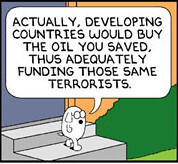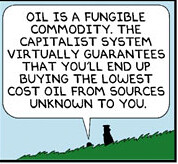Sunday's color Dilbert:
Dilbert: I'm thinking about buying a more fuel efficient car.
Dogbert: Why?

Dilbert: It's my patriotic duty to reduce this country's dependence on foreign sources of oil.
Dogbert: Why?
Dilbert: Because then the countries that hate us will have less money to fund terrorists.
Dogbert: Actually, developing countries would buy the oil you saved, thus adequately funding those same terrorists.
Dilbert: At least I wouldn't be funding them myself.
Dogbert: Actually money is a fungible commodity. The capitalist system virtually guarantees that you'll end up buying the lowest cost oil from sources unknown to you.
Dilbert: Well, maybe, but I want my car to make a statement.
Dogbert: And the statement would be "Hey, everyone, I don't know what fungible means!"
I will spot Adams it being a truism that you can't avoid buying oil from a certain source if they're all selling to a common pool of middlemen (hence, the word "commodity" is all important. The word "fungible," meaning exchangeable or replaceable, applies to oil to a considerable degree, both in terms of it being convertible to other energy and materials sources, and to a deficit in one energy source being made up by another, but it's not nearly as fungible as, say, money, whose only raison d'etre is fungibility. Any product - here, a resource - which is sold as a pooled commodity through the same middlemen is indeed impossible to separate out as a purchaser - one reason "voting with your dollars" can NEVER be a complete solution to social problems. By the way, Libyan sweet crude is not exchanged for lower quality Saudi oil, both are sold to brokers and thence to refiners, unless the refiners own the oil, and the entire production is blended in the market).

Step back and look at what Adams is saying: That if the United States didn't buy foreign oil, it wouldn't make the least bit of difference to the "countries that hate us" (many of which the American government call our allies) that "fund terrorists" (presumably including the US, an oil producing nation which funded terrorism in Cuba and Nicaragua and directly and through aid to Pakistan funded the Taliban and Al Qaeda). Beyond doubt, oil being the most useful form of energy now in existence, it's not like people will follow the lead of the US if it gives up oil. But how many people with even a high-school knowledge of economics believe that if the United States went from being the premier consumer of MidEast oil (let's assume that's what Adams means) to being a total nonconsumer, that the profits flowing into net oil-exporting nations wouldn't change? Or the implication that the countries that hate us pretty much openly have this fund earmarked "Terrorism" and it has budgetary needs that are open and easy to discern, and that funding this budgetary item would swim right along even if the demand for oil from the American side went down drastically or ceased altogether? In point of fact, Al Qaeda wants to overthrow the House of Saud and Hosni Mubarak and was trying to bring down Saddam Hussein. The terrorists get their money mostly through blackmail and kidnapping, although some of the spoiled members of the ruling class do kick in voluntarily out of their own enormous fortunes.
Taking for granted what Adams is assuming, that oil is bought on a market by actors in various nations, clearly it's being allocated on a supply and demand basis (of course, that's simplistic with a limited resource overseen by cartels, often pre-bought on long-year terms by refiners, etc. etc., but it's clearly what Adams means - and thinks other people don't understand). There must be some good reason why China, for instance, doesn't simply outbid the United States every time, whatever it takes, and use every drop pumped out of the MidEast every year. Of course, the truth is that the supply of oil can't increase forever, and the demand looks more robust than the supply, so prices should indeed rise over time. Therefore, if the natural increase is enough to offset the lack of the current greatest source of demand, then profits should indeed be adequate for "the nations that hate us to fund terrorists." Of course, if there's US demand that's equal to or greater than current demand, that will simply increase the profits of the evil nations all the more. That's the flip side of a commodity market, and the part Adams is too stupid to grasp. While you can't reduce the profits of a point net exporter of oil, (it's similar to the idea that you can "spot reduce" through exercise), by reducing overall demand (and again, what Adams is too moronic to grasp is that a more fuel-efficient car performs the same economic activities the less fuel-efficient car performed, so there's no competitive advantage to China, India, etc. from the loss of demand on the American side).
A more fuel-efficient car makes many statements - you believe in and understand science, including climatology and thermodynamics, at least enough to reap their benefits. You understand basic microeconomics and perhaps macroeconomics enough not to be holding to a ludicrous position on fuel usage. Clearly, nations that are more energy efficient will have a huge advantage over those that aren't, including selling the ability to be that way to them. Energy efficiency, really, IS economic efficiency, or close enough, since the bottom line of economic efficiency is maximum profit from a set pool of resources.
But I am going out on a limb here not just because this is so much hand-waving by Adams (yes, it's just a cartoon, but his success as a cartoonist has led Adams to try his hand at punditry and that makes his "reasoning" fair game wherever it manifests).
In the second part of this post, I will point out that what Adams is saying here directly contradicts something he maintained in The Dilbert Future, which managed to err just as strongly but in the dead opposite direction. Here, he suggests demand is inelastic and always higher than supply for oil and that any actor who reduces will be like a person hauling a boat out of the water - it will just close in over where the boat was, leaving no trace.
He maintained QUITE ANOTHER REALITY when it comes to Draconian statutes such as the "three strikes" laws, as you'll see. I'll wrap up by explaining why an ultrarich, ultrasuccessful cartoonist can still be EITHER a moron or a liar talking about economics.

No comments:
Post a Comment